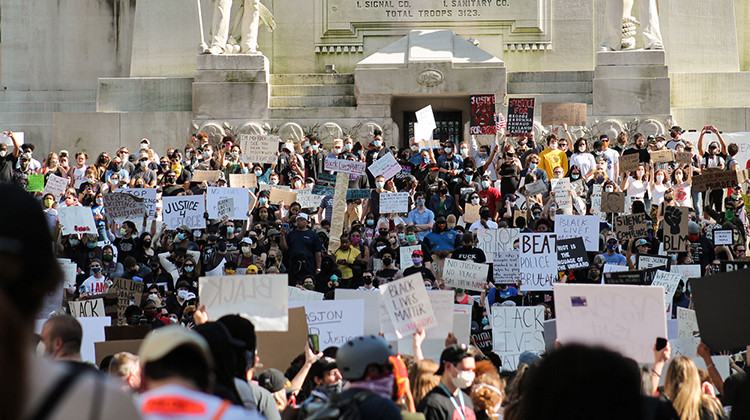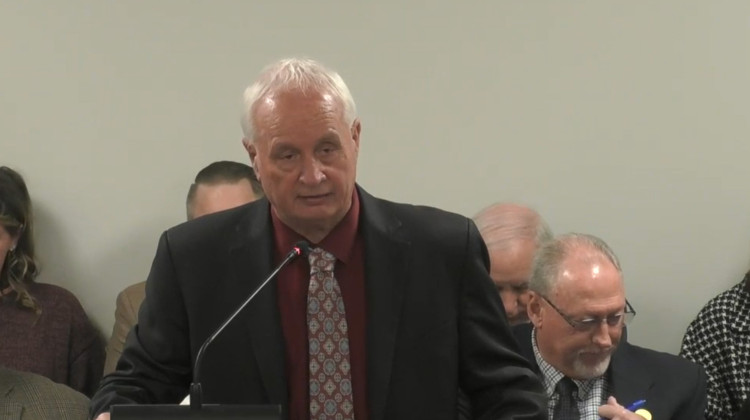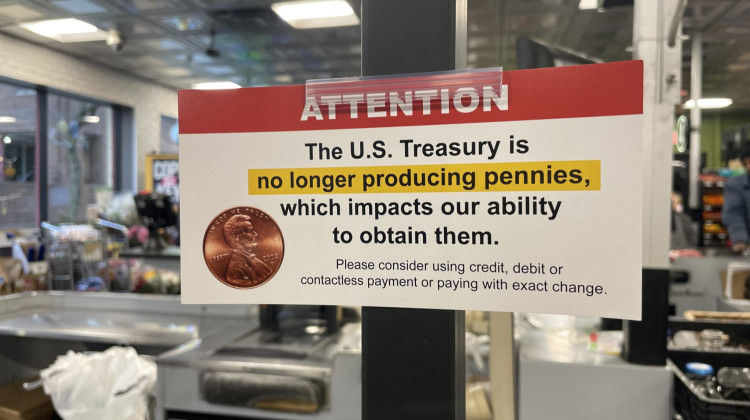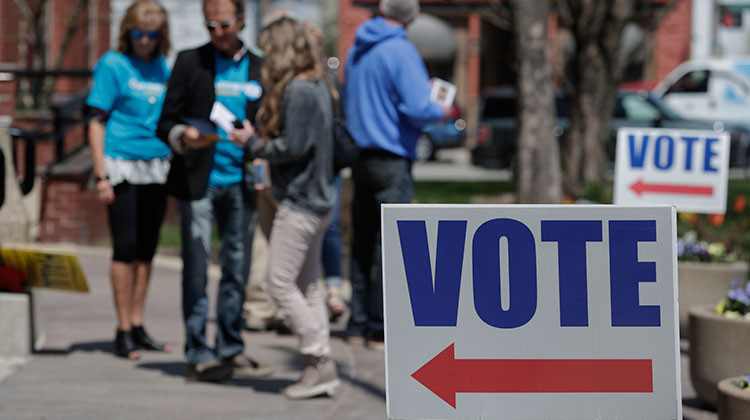
Protesters gathered on Monument Circle in Indianapolis in June 2020. Many of the protests in Indianapolis that summer focused on the death of Dreasjon Reed, who was shot and killed by an Indianapolis police officer as he ran from police following a car chase on May 6.
Lauren Chapman/WFYIMore than a year after the murder of George Floyd, law enforcement departments across the country are trying to involve community members in policing.
In Indianapolis, two police oversight boards were reformed to include a civilian majority -- the Use of Force Review Board and the General Orders Board. Both boards have begun to meet.
Here’s what you need to know about the Indianapolis Metropolitan Police Department’s Use of Force Review Board.
What is the Use of Force Review Board?
The board reviews instances in which police officers use force and then determines whether their actions violated IMPD policies.
The board starts its process once prosecutors and police have completed their investigations of an incident. The board does not have its own independent staff to conduct an investigation or to help review evidence. Instead, it relies on IMPD’s internal review.
Prior to a hearing, the board reviews an investigative file which can include body camera footage, officer and witness statements and detective notes. At the hearing, which is closed to the public, board members hear from the officer whose use of force is under review and the IMPD officers who have investigated the incident. The board can also ask for expert testimony.
Some law enforcement experts say the Use of Force Review Board’s ability to hold police accountable is limited. It cannot conduct an independent investigation. It cannot discipline or terminate officers, or even recommend specific actions. The board only determines whether an officer’s actions violated IMPD’s use of force policy. The police chief then decides whether an officer should be punished.
Who are the board members?
Nine members sit on this board, five are civilians. Two civilians were nominated by the mayor and three were chosen by the City-County Council. The police chief formally appoints the nominees and has final say on who sits on the board.
Like the General Orders Board, members of the Use of Force Review underwent training that included police ride-alongs.
The civilian members are:
- DeAndra Dycus, an activist whose young son lost his ability to speak and became paralysed after a stray bullet shattered his skull.
- Leon Jackson, the executive director of strategic initiatives at Byrum School of Business at Marian University.
- Michael-Bryant Hicks, general counsel at Apria Healthcare
- Kristen Abbott, owner and managing director of Abbott People Solutions, a human resources consulting firm.
- Myrna Martin, a health care liaison within the Indiana Department of Corrections.
The other four members are police: a captain, a lieutenant, a peer officer, and an officer selected by the Indianapolis Fraternal Order of Police, the police union. Members can be swapped out to avoid potential conflicts of interest, such as if they were involved in the incident themselves.
How is this different from before?
Before this summer, the Use of Force Review Board was formerly known as the Firearms Review Board, which included only members of law enforcement. The board reviewed use of force incidents only if a firearm was involved. Now the board reviews all types of force.
IMPD Deputy Chief Kendale Adams said conversations about changing the makeup of the board began in 2017 with former IMPD Chief Brian Roach.
“We flew out together to Las Vegas to take a look at that board and see what the makeup of that board was and to get some input and ideas on how they were handling critical incidents,” Adams said. Unlike Indianapolis, Las Vegas included civilian members.
Then in 2020, Randal Taylor became the new chief of IMPD, and the City-County Council passed a proposal to create the Use of Force Review Board and implement a civilian majority. The IMPD General Orders Board was also reformed to have a civilian majority.
“It was critical to have a perspective other than the police,” Adams said.
What do members think about the board?
Michael-Bryant Hicks is one of Mayor Joe Hogsett’s nominees to the board, and works as general counsel at Apria Healthcare. Hicks said once he heard the Use of Force Review Board would include civilians, he reached out to Hogsett’s office.
“I was convinced by meeting with him and a couple of members of his staff that they were serious about making progress in terms of relationship between police and communities, in terms of the issue of policing, and appropriate use of force, and so forth,” Hicks said. “Their hearts were in the right place.”
Hicks said as a lawyer, he negotiates agreements daily, which he said has prepared him to be a board member.
“That process orients you towards problem solving and towards helping everybody get along for some greater good,” Hicks said.
What do community members hope the board does?
Darian Bouie, a member of Faith in Indiana and senior pastor at Progressive Baptist Church said the killings of Black men by police officers nationally like Floyd and locally like Dreasjon Reed made it apparent that more community involved policing was necessary.
“I think this opens the door to accountability,” Bouie said. “[Police] are supposed to be serving the needs of civilians.”
Bouie said Faith in Indiana petitioned Hogsett’s office, asking for civilians to sit on both the General Orders Board and Use of Force Review Board.
“Rather than continuing to have to march, the conversation was built around, ‘How can we put practices in place so that use of force would be an absolute last resort?’” he said.
Pastor David Greene, president of the Concerned Clergy of Indianapolis, said since the public is not allowed to attend the board’s meetings, civilian members should be transparent with community members after they have finished reviewing a case.
“It's going to be important that someone from the board come back and talk with the community,” Greene said.
Contact WFYI criminal justice reporter Katrina Pross at kpross@wfyi.org. Follow on Twitter: @katrina_pross.
Pross is a Corps Member of Report for America, an initiative of The GroundTruth Project.
 DONATE
DONATE






 Support WFYI. We can't do it without you.
Support WFYI. We can't do it without you.